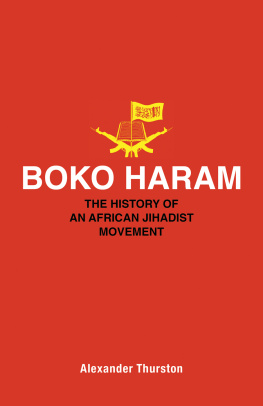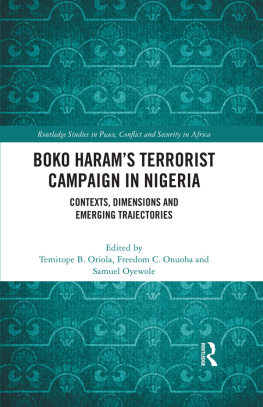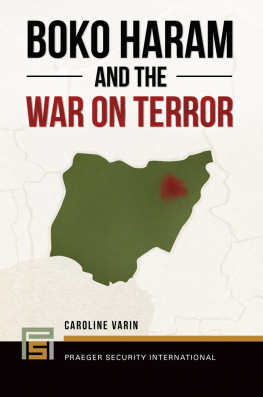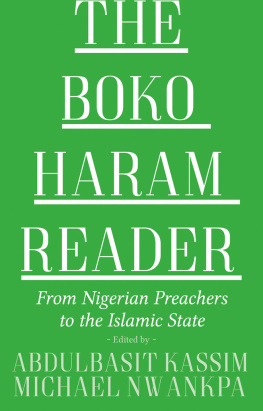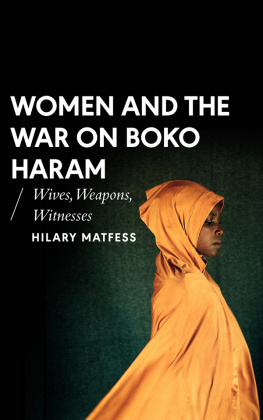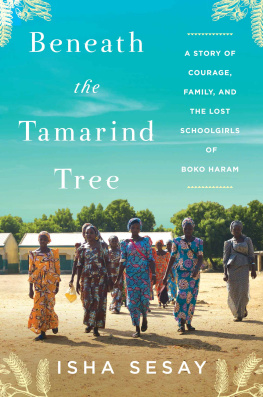
Boko Haram

PRINCETON STUDIES IN MUSLIM POLITICS
Dale F. Eickelman and Augustus Richard Norton, Series Editors
A list of titles
in this series
can be found at the
back of the book.
Boko Haram
THE HISTORY OF AN AFRICAN JIHADIST MOVEMENT

Alexander Thurston
Princeton University Press
Princeton and Oxford
Copyright 2018 by Princeton University Press
Published by Princeton University Press, 41 William Street, Princeton, New Jersey 08540
In the United Kingdom: Princeton University Press, 6 Oxford Street, Woodstock,
Oxfordshire OX20 1TR
press.princeton.edu
Jacket design by Kathleen Lynch
Maps produced by Miles Irving, University College London. www.Milesmap.co.uk.
All Rights Reserved.
Library of Congress Cataloging-in-Publication Data
Names: Thurston, Alexander, author.
Title: Boko Haram : the history of an African jihadist movement / Alexander Thurston.
Other titles: Princeton studies in Muslim politics.
Description: Princeton : Princeton University Press, 2018. | Series: Princeton studies in Muslim politics | Includes bibliographical references and index.
Identifiers: LCCN 2017013034 | ISBN 9780691172248 (hardcover : alk. paper)
Subjects: LCSH: Boko Haram. | Terrorist organizationsNigeria. | TerrorismNigeriaReligious aspectsIslam. | Islamic fundamentalismNigeria. | Jihad. | Islam and politicsNigeria.
Classification: LCC HV6433.N62 B68 2018 | DDC 363.3250966923 LC record available at https://lccn.loc.gov/2017013034
British Library Cataloging-in-Publication Data is available
This book has been composed in Minion Pro and ITC Avant Garde Gothic Std
Printed on acid-free paper.
Printed in the United States of America
1 2 3 4 5 6 7 8 9 10
Contents

Acknowledgments

Given the bleak nature of its subject matter, this book was sometimes difficult to write, intellectually and at times emotionally. I have incurred a number of debts along the way. First, I thank Fred Appel and Princeton University Press for commissioning the book. I am grateful to Thalia Leaf and Stephanie Rojas of the press for their help. Three anonymous reviewers for the press provided suggestions and feedback that strengthened the book. I also thank William McCants and Shadi Hamid of the Brookings Institutions Project on U.S. Relations with the Islamic World for commissioning the paper The Disease Is Unbelief: Boko Harams Religious and Political Worldview, on which part of this book is based. Anne Peckham of Brookings provided invaluable editorial and technical assistance for that project. Some portions of the paper appear verbatim in , while other portions have been modified and updated.
Second, I would like to express gratitude to the community of scholars and thinkers who work on the grim topic of Boko Haram. I have benefited tremendously from exchanges with Marc-Antoine Prouse de Montclos, Adam Higazi, Hilary Matfess, Andrea Brigaglia, Carmen McCain, Paul Lubeck, Murray Last, Freedom Onuoha, Abdulbasit Kassim, and Ambassador John Campbell. I owe special thanks to Brandon Kendhammer for sharing several key sources with me. I have also leaned heavily on the work of scholars whom I have not met, including Kyari Mohammed and Abdul Raufu Mustapha, and of scholars whom I met briefly long ago, such as Ahmad Murtada. I owe major intellectual debts to the community of scholars and practitioners who study Nigeria more broadly, including Muhammad Sani Umar, Roman Loimeier, John Paden, Peter Lewis, Carl LeVan, and Matt Page. I am also indebted to scholars who study jihadism, especially Aaron Zelinwithout his meticulous efforts to collect and preserve jihadist primary sources, this book could not exist in its present form. All errors of fact or interpretation in the book are mine alone, of course.
Third, I thank colleagues at Georgetown University, my academic home since 2014. Scott Taylor, Lahra Smith, and Ken Opalo of the African Studies Program are wonderful and supportive colleagues. I also value the ongoing mentorship I receive from John Voll and Jonathan Brown. Early research related to this book was presented at Georgetowns Prince Alwaleed bin Talal Center for Muslim-Christian Understanding in October 2014, and I am grateful for that opportunity.
Finally, I thank my family and friends. My wife, Ann Wainscott, spent long hours with me patiently discussing the material, ideas, and arguments that have gone into the book. Her love and support mean a great deal to me. I also appreciate the encouragement I received from my parents, Robert Thurston and Margaret Ziolkowski; my sister, Lara Thurston; and my grandparents Theodore and Yetta Ziolkowski, all of whom carefully followed the books progress. My son, Jack, made for delightful company during the final revisions of the book. It is my hope that by the time he reaches adulthood, our world will be less turbulent and violent.
This book is dedicated to all the victims of the Boko Haram crisis, especially the innocent but also those who, through their recklessness, have wronged themselves and others.
Boko Haram

Introduction

Boko Haram, a movement claiming to act in the name of Islam, has killed tens of thousands of people in Nigeria and the neighboring countries of Niger, Chad, and Cameroon. Tens of thousands more have died amid the broader crisis that Boko Haram precipitated. Civilians, Muslims and Christians alike, have fallen victim to hunger and disease, and millions in the region now face precarity. Others have been killed by the Nigerian security forces, whose heavy-handed response to Boko Haram has exacerbated the conflict. Boko Haram is one of the deadliest jihadist groups in the world, and the crisis surrounding it is one of the globes worst.
Boko Haram took shape in the northeastern Nigerian city of Maiduguri in the early 2000s. The group became notoriousbut also attracted supportfor its contention that Western-style education (in the Hausa language, boko) was legally prohibited by Islam (in Arabic and Hausa, haram). In Boko Harams eyes, Western-style education belonged to a larger, evil system. That system included multiparty democracy, secular government, constitutionalism, and man-made laws. For Boko Haram, all these institutions are not just un-Islamic but anti-Islamic.
Over time, Boko Haram has preserved core elements of its message. But Boko Haram has also periodically shifted its strategies, tactics, and self-presentation. This book reconstructs the movements history, paying attention to how its doctrine interacted with the changing environment around it.
The book is organized chronologically, dividing Boko Harams career into five phases. First, there was the movements prehistory: the decades from the 1970s to the 1990s, when its future founders grew up amid political uncertainty, disruptive urbanization, interreligious violence, and widespread debate about the relationship between Islam and politics. Second, from approximately 2001 to 2009, there was a phase of open preaching. One portion of Boko Haram attacked local authorities in 20034, but the groups decisive turn to violence occurred in 2009, when the sect launched an uprising across several northern Nigerian states. This rebellion was crushed, and Boko Harams founder, Muhammad Yusuf, was killed by police. A third phase, from 2010 to 2013, centered on terrorism. Led by Yusufs companion Abubakar Shekau, Boko Haram bombed major targets, including in the capital, Abuja, and perpetrated regular assassinations and raids in the northeast.
Next page
